On June 3, 2016, news broke that one of the people close to His Holiness the Dalai Lama has been arrested on suspicions of money laundering. This is just the latest in a series of financial scandals to rock the Tibetan leadership who, over the last two decades, have been accused of facilitating all levels of financial misdirection from corruption and embezzlement, to money laundering.
Whenever it comes to finances, there is never good news from the Tibetan leadership. Having left behind in Tibet centuries of accumulated wealth, when they entered exile the Tibetan leadership found that they could rebuild their coffers by tapping into the sympathy and resources of the West. Thus began 60 years of fund-raising, without any accountability or transparency to the donors.
All levels of the Tibetan leadership have been implicated in some kind of financial scandal. For example:
- In 2011, Indian investigators raided Gyuto Monastery where they found USD1mil in 26 foreign currencies, in cash. This resulted in Indian prosecutors initiating criminal proceedings in 2015, charging His Holiness the 17th Karmapa Orgyen Trinley with money laundering (one such report can be found here)
- Since 2012, questions have been asked about Penpa Tsering’s connection to one Thinley Kelsang who is accused of operating a human trafficking and visa brokering ring. Penpa Tsering is accused of abusing his position in Dharamsala to obtain visas from the American Embassy in Delhi. He is alleged to have received financial compensation for this. (one such report can be found here)
- In 2014, the Tibetan exile Prime Minister Lobsang Sangay refused to answer questions about how he had managed to pay off a $227,000 mortgage just four years after buying a house in Boston, USA. Just a week later, he became Prime Minister (the publicly available document that triggered these investigations be found here)
- In March 2015, Penpa Tsering stormed out in the middle of a Parliamentary session after he was accused of murder. In the same session, two of his colleagues Dolkar Lhamo and Dawa Tsering were reminded of their involvement in embezzlement schemes and taking public property (one such report can be found here)
- In June 2015, Maura Moynihan wrote a widely-circulated letter addressing the International Campaign for Tibet’s (ICT) fondness for huge fundraising efforts, with little difference made seen in the Tibetan situation. In the letter, Ms Moynihan stated that “ICT is hardly a cost-effective model of a non-profit organization representing a small, penniless refugee community… Many Tibet support groups are concerned that ICT has no clear purpose other than self-preservation, raising funds to pay for trips to Asia, comfortable salaries and maintenance of an elegant townhouse in Dupont Circle officially assessed to be worth $2.7 million. Many activists groups have done far more on far less, but ICT remains the top-funded Tibet organization in America (her report can be found here)
- In May 2016, His Holiness the 41st Sakya Trizin announced major changes in the succession plan of the Sakya throne holders. In the announcement and directive, he noted that people have accused him of taking advantage of and benefiting from the office and position (the Sakya Trizin’s announcement can be found here)
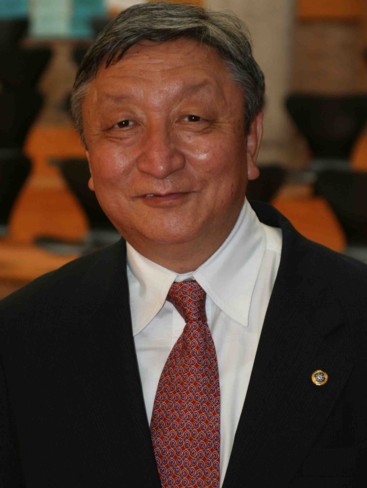
Lodi Gyari Rinpoche, the Dalai Lama’s former Special Envoy to Washington has a history of questionable financial dealings.
As anyone can clearly see, these are not minor accusations on the level of a teenager robbing a mom-and-pop store in Dharamsala. They are sophisticated schemes involving connections, power and large sums of money…and these are just the scandals that we know of. Such major financial irregularities have not gone unnoticed by the international community. In 2012, Congressman Dana Rohrabacher wrote to the Tibetan Prime Minister Lobsang Sangay, noting that there have been “serious accusations the US funding meant for Tibetans may have been misspent.”
A large portion of this US funding has come not only from the American government but from private donors, channeled through organisations such as the aforementioned International Campaign for Tibet (ICT). It so happens that the ICT’s previous director was Lodi Gyari Rinpoche whose son-in-law, Phakchok Rinpoche, is implicated in the latest money laundering scandal to hit the Tibetan leadership.
From 1999 to 2014, Lodi Gyari was director of the ICT. To this day, ICT remains one of the largest Tibetan non-governmental organisations (NGOs) in the world, and it certainly the top-funded in the USA. Lodi Gyari’s role as director gave him access to millions of dollars in donations as well as connections to wealthy Tibetan supporters in the United States. When he was the Dalai Lama’s Special Envoy to Washington, DC, his connections in Dharamsala also gave him the uncontested access to money-making opportunities for himself and his relatives. It would seem that Phakchok Rinpoche has been one such beneficiary.
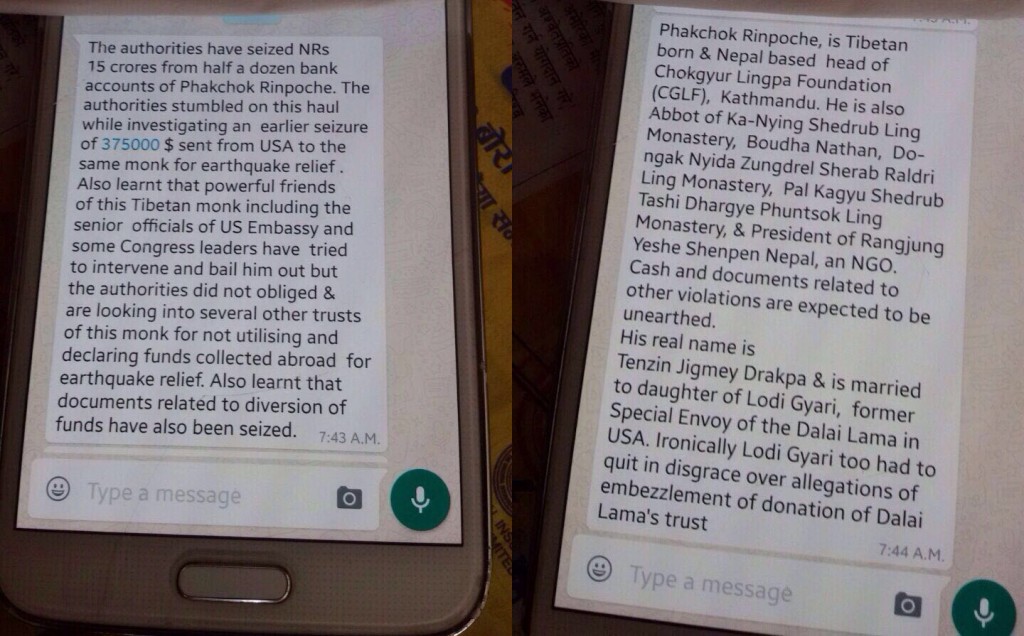
Messages have been circulated on social media about the involvement of Lodi Gyari Rinpoche’s son-in-law in the latest financial scandal to hit the Tibetan establishment. Lodi Gyari is the Dalai Lama’s former Special Envoy to Washington and comes from a wealthy, powerful Tibetan family. He has very close links to the Dalai Lama.
Phakchok Rinpoche, whose real name is Tenzin Jigmey Drakpa, is married to Lodi Gyari’s daughter. He holds a number of positions, including the abbotship of Ka-Nying Shedrup Ling Monastery in Nepal and President of Rangjung Yeshe Shenpen Nepal, an NGO. From Phakchok Rinpoche’s various bank accounts, Nepali authorities recently seized NPR15 crores (approx. US$1.4mil). This followed their previous seizure of US$375,000, an act which had alerted them to the even larger sums of money he had been receiving. In this case, the US$375,000 had been sent from the USA to his bank accounts, on the pretext of raising funds for victims of the 2015 Nepali earthquake.

Phakchok Rinpoche, Lodi Gyari’s son-in-law, is suspected of being involved in money laundering.
It requires an active imagination to conjure up reasons why Lodi Gyari and Phachok Rinpoche would need to fatten their wallets. It is well-known in the Tibetan community that the Gyari family is extremely wealthy and powerful, and have been so even when they were back in Tibet.
What this incident shows for certain is that there has been no change to the feudal system of Tibet where the rich and nobility get richer, while the poor continue to languish in poverty. After all, it is definitely not news that the Tibetan leadership exploits and abuses their people. After 60 years in exile, there has been little change to the Tibetan situation – their standard of living has hardly improved, considering the millions they have received in donations. In this case, Lodi Gyari and Phakchok Rinpoche have even abused the goodwill of the international community, raising funds from Western donors for earthquake victims, when the funds never made it to the intended recipients.
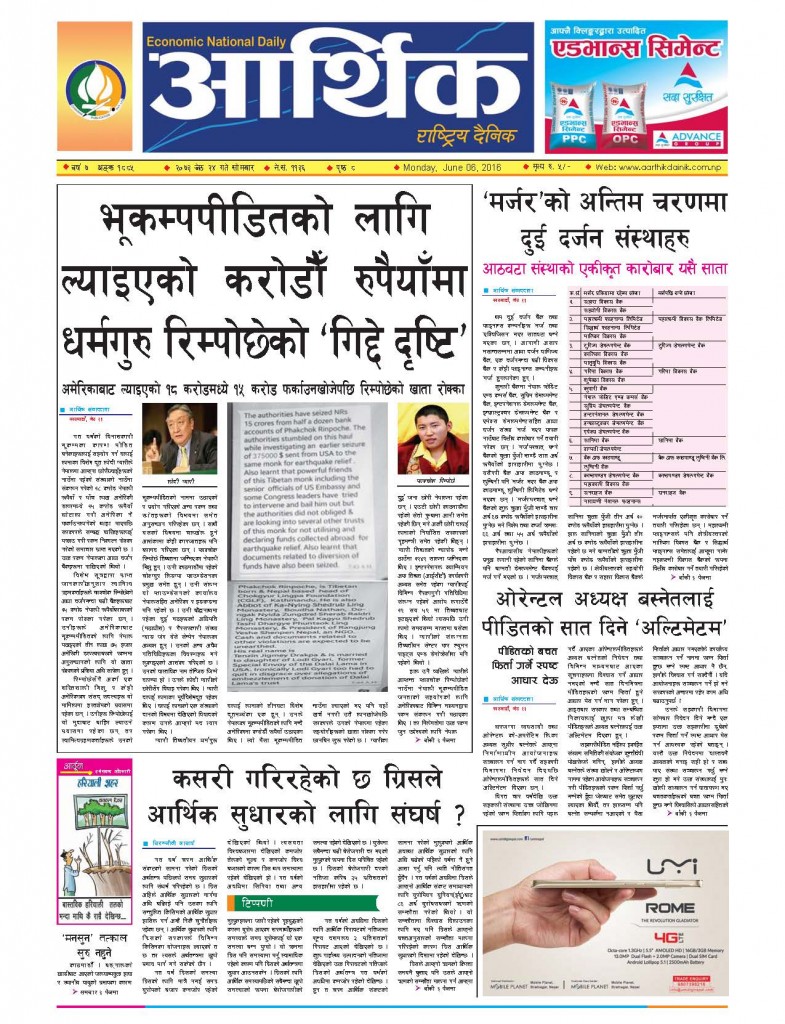
Nepali media coverage of this financial scandal, which involves Lodi Gyari Rinpoche’s son-in-law, Phachok Rinpoche being accused of being involved in money laundering. Click to enlarge
The Tibetan leadership is an old hand at allowing their people to continue to suffer, by stealing money that was intended for their welfare. After all, the Tibetan leadership’s aim is not the betterment of their people but rather to accumulate as much money and power for themselves as possible so that when His Holiness the Dalai Lama enters clear light, they can easily disappear to the West with their foreign passports, checkbooks and American Express cards.
And if the money laundering is taking place at such a high level, it is impossible that His Holiness the Dalai Lama is not aware of what is going on. It seems that His Holiness has somehow become surrounded by people who have been implicated in one financial scandal or another – from his chosen Karmapa Orgyen Trinley, to his Special Envoy Lodi Gyari, to the Speaker of his Parliament Penpa Tsering, to his Prime Minister Lobsang Sangay. Clearly those in the Dalai Lama’s inner circle have made it a habit to exploit the Dalai Lama’s name, reputation and their closeness to him, in order to pad their bank accounts.
With such a bevy of financial scandals under their belt, it is particularly galling that the Tibetan leadership would see it fit to accuse Dorje Shugden practitioners of receiving money from the Chinese leadership. While they accuse Dorje Shugden practitioners of “eating Chinese money”, they themselves “eat” their own people’s funds. Surely stealing from your own family is a more hurtful action, when you abuse their clearly misplaced trust in you.
Whether or not Dorje Shugden practitioners receive support from anyone is a private matter, and there has never been any proof or evidence to support these allegations. In the 20 years Dorje Shugden devotees have been used as a scapegoat for the Tibetan leadership’s failure, not one shred of evidence has been produced to show that Dorje Shugden lamas and their disciples receive Chinese funding. No receipts, no bank statements, no photographs, no check stubs. There has been however, plentiful proof to support allegations that the Tibetan leadership has been stealing from their people, and have engaged in serious financial malpractice – some have even been prosecuted by the Indian government!
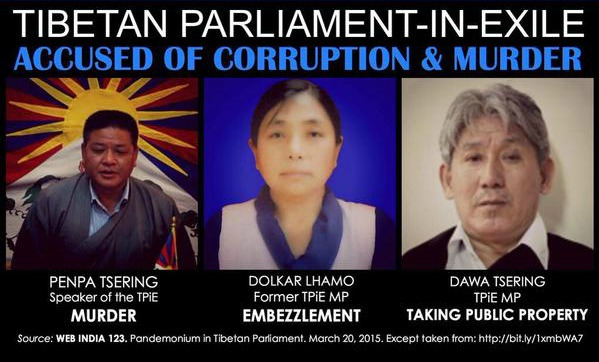
While the Tibetan leadership have been accusing Dorje Shugden practitioners of taking money from the Chinese leadership, they themselves have been rather busy stealing from their own people.
Therefore the fact that the Tibetan state and its agents are engaged in money laundering and embezzlement should be of greater concern. The leadership serves everyone, not themselves and they certainly should not be exploiting their people’s unquestioning faith in order to profit from it. The Tibetan leadership also represents their entire people. If they are being consistently implicated in financial scandal, it stains the name of the entire Tibetan people and not just a small subsection of practitioners from such and such a lineage.
The Tibetan people should be similarly concerned that their leadership steals money meant for their welfare, and that they spend it on activities and programs to suppress their community. For example, the leadership has spent money on anti-Dorje Shugden websites to promote a negative view about the deity and suppress their religious freedoms. It is astonishing that a ‘democratic’ government would set up an anti-anything website when it is not the job of the state to police private religious beliefs.
But it is hardly surprising that the Tibetan leadership would fund such activities because the concept of a real democracy has yet to ripen in their minds. For example, in real democratic nations, leaders declare all sources of their income and their financial dealings are constantly under scrutiny, with watchdogs give the authority to oversee all of their funding. There is no such measure in Tibetan society where the leadership acts with impunity, in an authoritarian and dictatorial manner designed to abuse their community.
So what the Tibetan people should be more worried about is the ongoing lack of transparency regarding their leadership’s finances, and how no one is being held accountable for these scandals. And it needs to be asked – why is the Dalai Lama remaining silent in all of this, allowing his community to suffer the actions of the leadership, when he is aware of everything that is taking place? Why does he speak up more about Dorje Shugden and the lamas who refuse to give up the practice, than he does about his inner circle stealing and his people self-immolating?
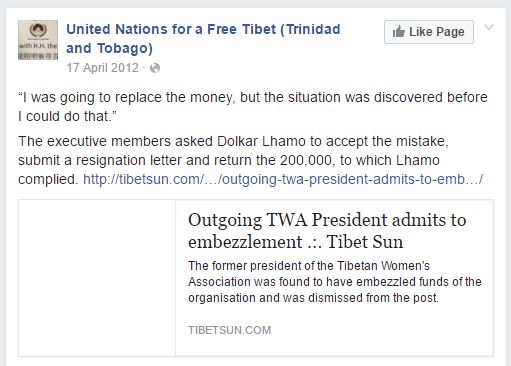
Dolkar Lhamo, the Member of Parliament accused of embezzlement admitted to her crimes. Rather unsurprisingly, the link that this Facebook post refers to is no longer working, with the article having been removed.
With such overwhelming evidence of the Tibetan leadership’s misdeeds, it is only a matter of time before international support for their works draws to a close. Why make personal donations and direct federal funds towards a regime that has consistently failed to disburse the contributions to the rightful recipients, the Tibetan people? If Western leaders direct funds to the Tibetan leadership thinking that Dharamsala shares their interests (that is, to be an effective thorn in the side of the Chinese), they are sorely mistaken.
China’s popularity and economic strength eclipses anything the Tibetan leadership can do to them and from the already-long and growing list of financial malpractices that the CTA is very quickly adding to, soon it will be clear for all to see what many have known for decades. Ultimately, the Tibetan leadership is and always has been about looking after No. 1 and no matter what they may profess, they have only their own (and no one else’s) interests in mind.
Examples of the Central Tibetan Administration’s financial malpractice
2011 – His Holiness the Karmapa Orgyen Trinley Dorje (money laundering)
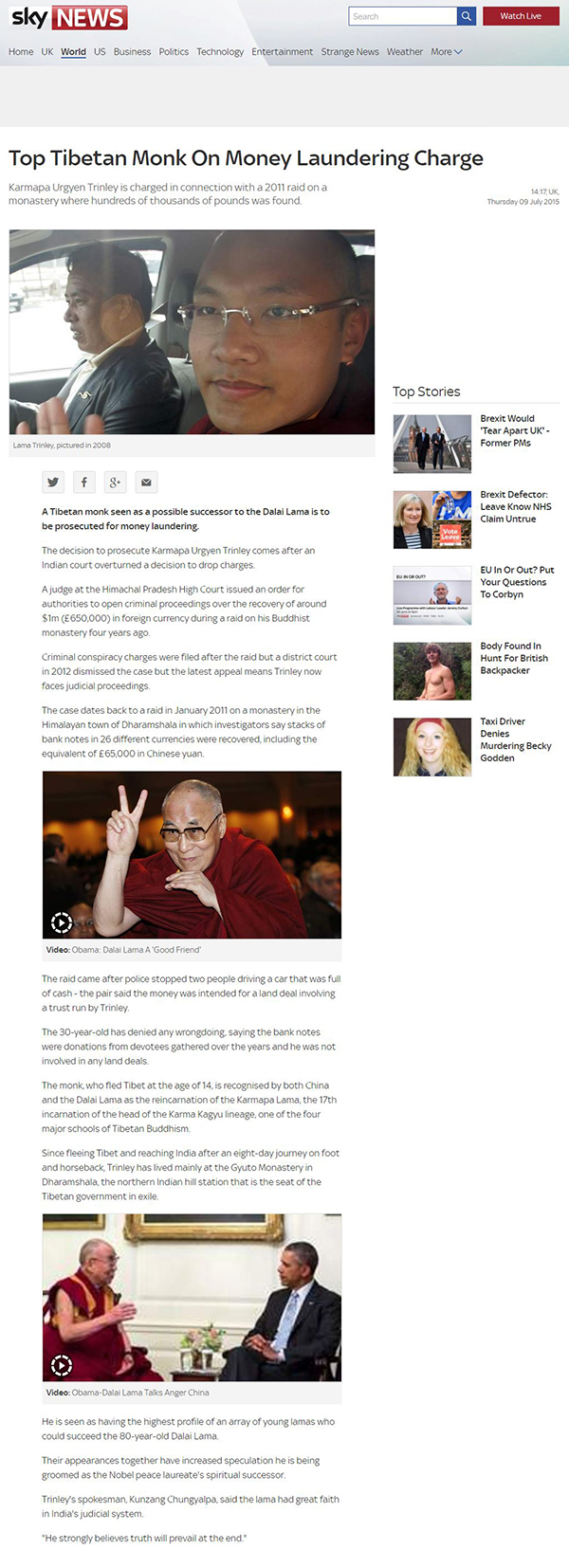
2011 – the Karmapa Orgyen Trinley Dorje prosecuted on charges of money laundering. Click to enlarge.
2012 – Penpa Tsering (human trafficking)

2012 – Penpa Tsering implicated in human trafficking ring. Click to enlarge.
April 2012 – Chithue Dolkar Lhamo (embezzlement)

April 2012 – Dolkar Lhamo, former President of the Tibetan Women’s Association, admits to embezzlement. Unfortunately, but not unsurprisingly, the original article on TibetSun.com is no longer available. Click to enlarge.
November 2012 – the Central Tibetan Administration (financial mismanagement)
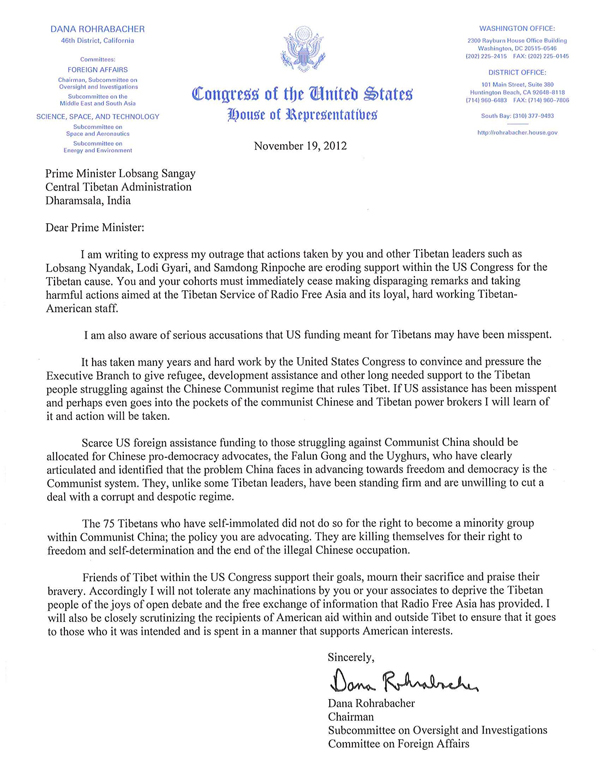
November 2012 – US Congressman Dana Rohrabacher writes to the Central Tibetan Administration (CTA) to highlight their financial mismanagement and involvement in the Radio Free Asia issue. Click to enlarge.
2014 – Prime Minister Lobsang Sangay (corruption / embezzlement)
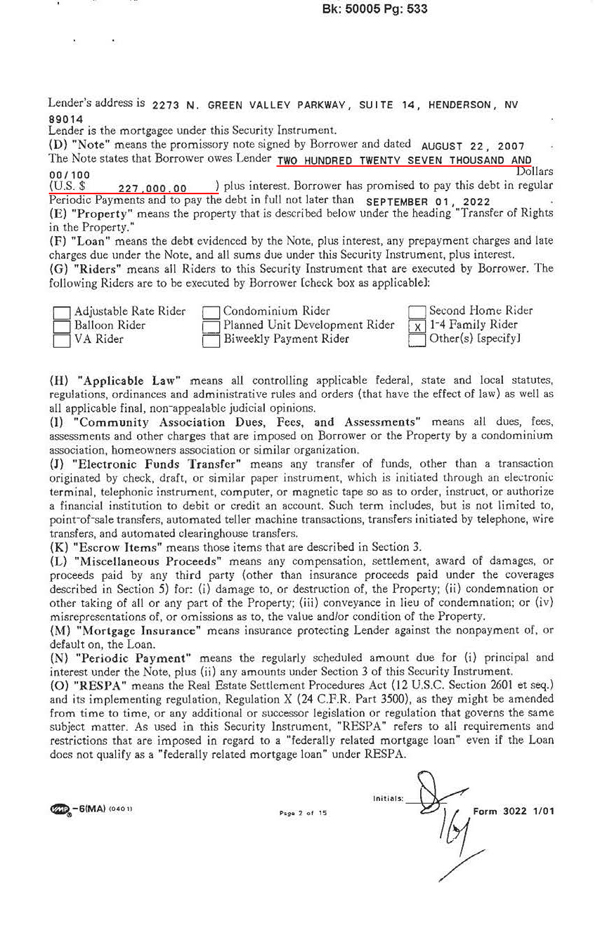
2014 – publicly available records show that Lobsang Sangay took out a $227,000 mortgage on his home in 2007. It was discovered that he paid off the entire mortgage just four years after purchase, and one week before he was sworn in as the Tibetan exile Prime Minister. Click to enlarge.
March 2015 – Penpa Tsering (murder), Dolkar Lhamo (embezzlement), Dawa Tsering (privatising public property)

March 2015 – in the middle of a Parliamentary session, the Speaker Penpa Tsering abruptly resigns and storms out of the session after being accused of murder. In the same meeting, his colleagues were accused of embezzlement and the unauthorised privatization of public property. Click to enlarge.
June 2015 – Lodi Gyari (wastage of public funds, financial mismanagement)
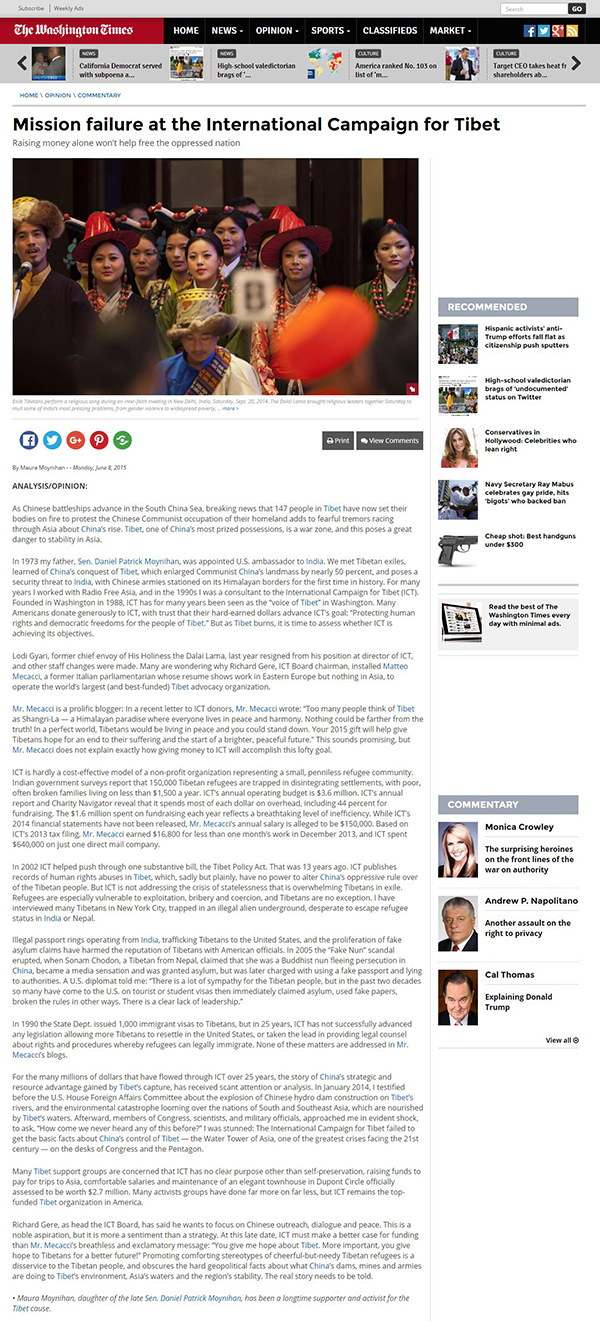
June 2015 – Maura Moynihan, the daughter of Senator Daniel Moynihan and a long-time Tibet supporter, accuses the International Campaign for Tibet (ICT) of wasting public donations and financial mismanagement. ICT was under the directorship of Lodi Gyari between 1999 and 2014. Lodi Gyari’s son-in-law is now accused of money laundering. Click to enlarge.
July 2015 – Prime Minister Lobsang Sangay and the Central Tibetan Administration (financial mismanagement)
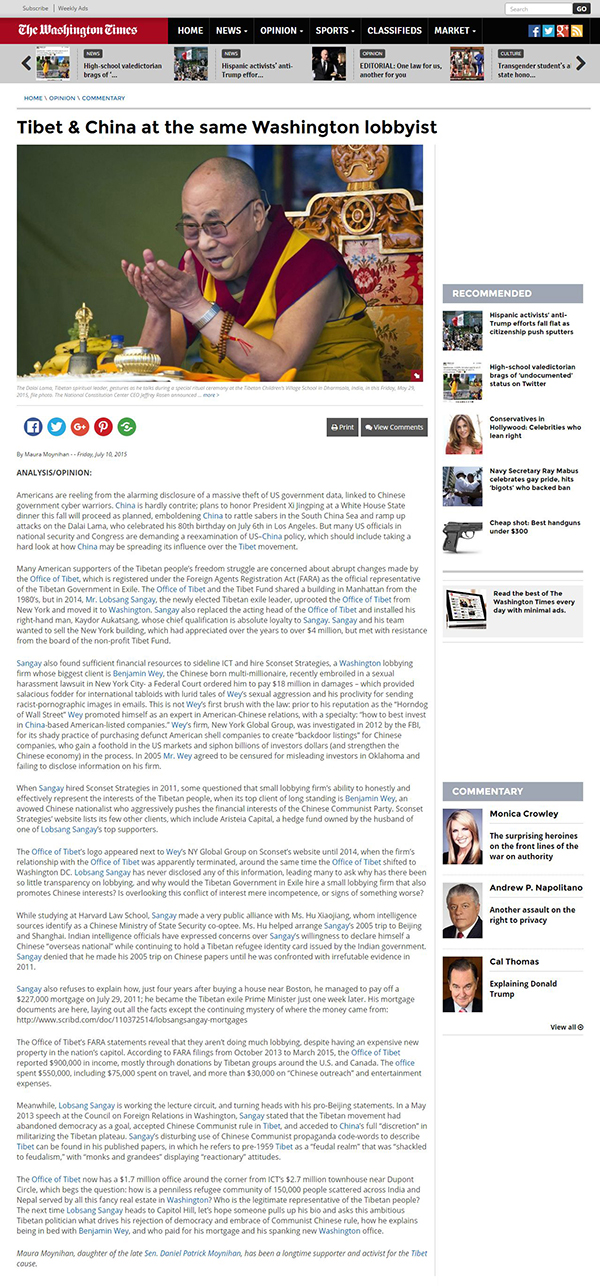
July 2015 – Ms Moynihan questions Tibetan Prime Minister Lobsang Sangay’s other financial dealings. Click to enlarge.
May 2016 – His Holiness the 41st Sakya Trizin (corruption)
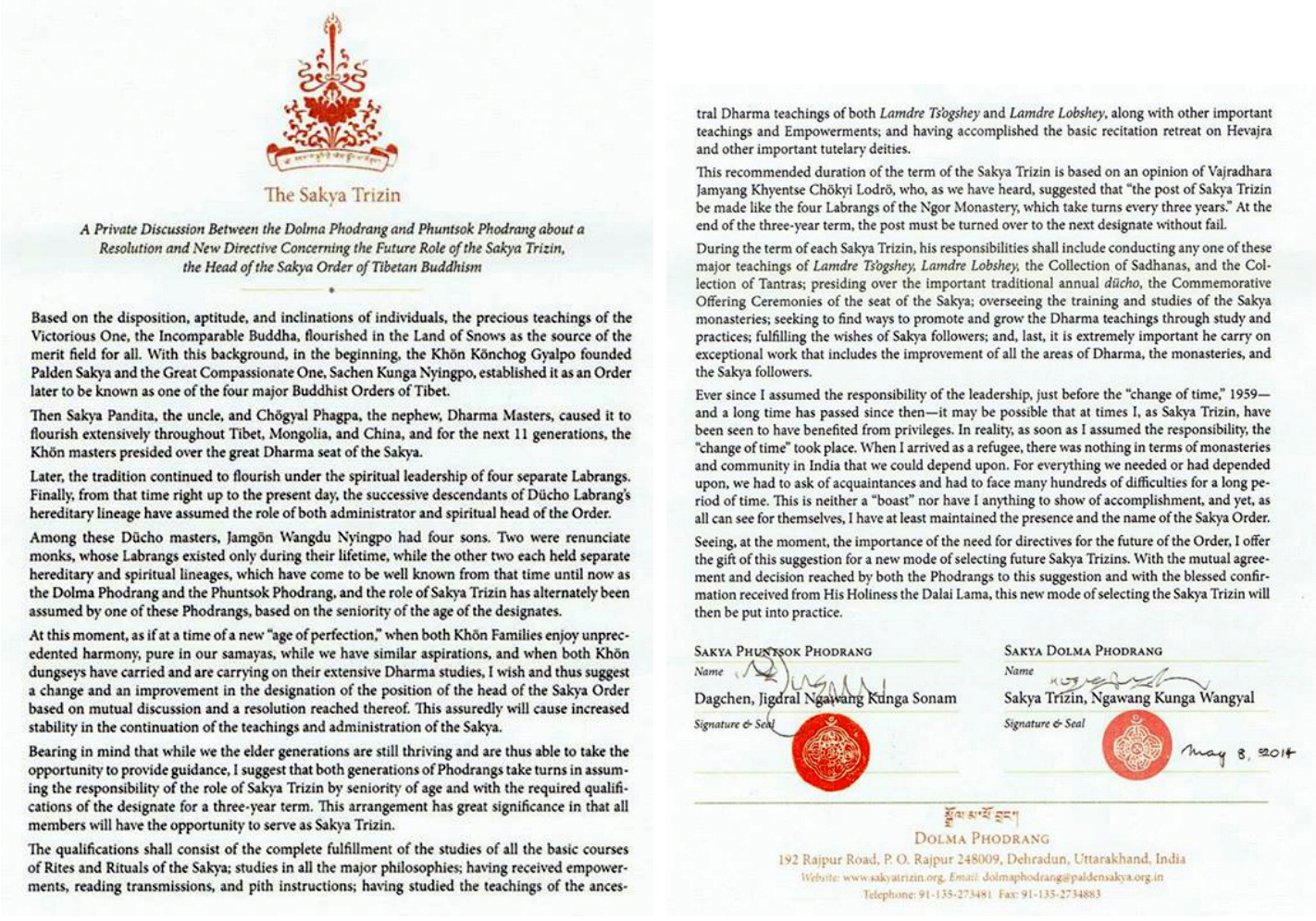
May 2016 – His Holiness the 41st Sakya Trizin announces major changes to the succession plan of the Sakya throne holders. In the directive, he also addresses accusations that have been directed at him regarding the benefit he has received in his position as the Sakya Trizin. Click to enlarge.
MORE NEWS LIKE THIS